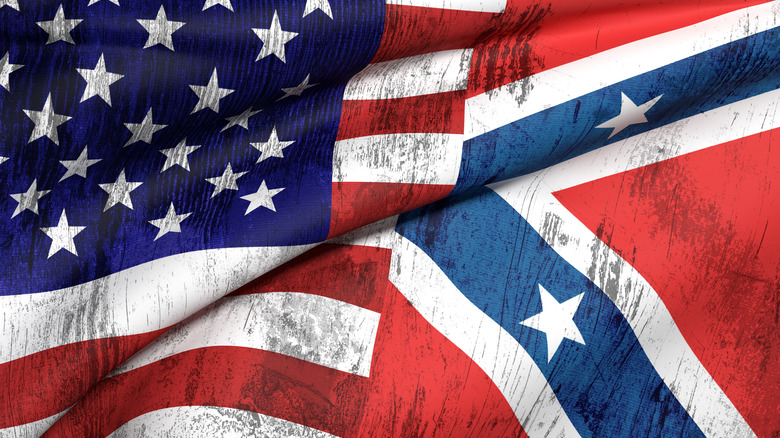How Some Counties In Alabama Fought Against The Confederates In The Civil War
The United States still struggles with the legacy of the Civil War, which divided the country along a stark geographical border. In 2020, political activism swelled and confederate monuments were torn down. As of February 2022, protests lead to the removal of 73 statues and monuments, which ascribed glory to members of the Confederate Nation (via CNN). However, one of the 723 monuments left standing posed such a quandary that anti-monument movement efforts were focused elsewhere (via Birmingham Watch).
Deep below the Mason-Dixon line, the Winston County courthouse in Alabama is home to a somewhat pro-Union army memorial. Some people have described the Dual Destiny Monument erected in 1987 as bizarre (via Roadside America). As if they could only pay for a one-figure statue, the monument features a single soldier adorned in a half-Union, half-Confederate uniform (via Birmingham Watch). A poetic inscription explains their blue and gray uniform "once fresh and clean were now as worn and patched as the bodies and souls they contained" (via Encyclopedia of Alabama). This courthouse monument acknowledges the dual affiliation of Winston County during the Civil War. The monument's inscription honors the 239 Union and 112 Confederate soldiers from Winston County (via Roadside America).
How these Union loyalists found themselves surrounded by Confederate neighbors is a unique tale of how geographical and socioeconomic pressure can construct our beliefs. The landscape on which we make our homes influences our economy, politics, and beliefs. Regional geography within Confederate States in part shaped political loyalties.
Geography shaped beliefs
In the late 1800s, Winston County was the poorest in Alabama. Col. Abel D. Streight of the Union Army would later describe people here as "mostly poor" whites (via 1st Alabama Cavalry). Except for lowlands and creek bottoms, the thin soil that dressed the dense forests and hillsides could sustain little farming (via "Alabama As It Is" by B.F. Riley). This geography extended into east Tennessee, northern Georgia, western North Carolina, and West Virginia (via 1st Alabama Cavalry).
The plantation economic model prominent in the rest of the state was untenable in Winston (via 1st Alabama Cavalry). Without the king-crop cotton, residents could see no economic benefit from the continuation of slavery (via Ask Alabama on YouTube). Free labor arguably made their work less valuable.
In general, the people of Winston County often harbored disdain for the upper classes. Residents felt they were thought of as uneducated and inferior whites (via 1st Alabama Cavalry). Slave-holding families rarely married into non-slave-holding families, further deepening the class divide. The wealthy class argued that the existence of a slave class elevated poor whites a rung above the bottom of society (via H Net). But this privilege provided little assurance and no benefits.
Winston County opposes succession
The Alabama Secession Conference met in January 1861 with the goal to protect "the rights, interests and the honor of the State of Alabama." Winston County was represented by a schoolteacher named Christopher Sheats (via CBS42). Sheats found himself in the minority, surrounded by separatists who believed that those who opposed secession "must be looked and dealt with as public enemies" (via "Alabama Secedes from the Union: An Address by Judge Water B. Jones"). The temper of the courthouse ranged from alarmist to bitter, sensationalist to solemn. With tears in the eyes of more than a few delegates, a 61 majority voted to leave the Union, over a 39 minority.
Even though a number of Alabama counties voiced their opposition to secession, the separatist fervor emboldened a harsh response to dissenting voices (via Alabama Heritage). Sheats refused an order to pledge an oath to the Secessionist movement. "I am an American and an Alabamian," he declared. "I don't need to sign anything to prove who I am" (via CBS42). This and other statements would later land him in jail.
As the war began, the governor warned "... in case a draft should be ordered, the Western portion of Walker — And the whole of Winston County will be among the first included, as it is notorious that they have not furnished anything like their proportion of volunteers" (via 1st Alabama Cavalry).
Dissenting voices were targeted
Col. Streight of the Union Army spent time in northern Alabama during the war, fighting for control of the Tennessee Valley and recruiting Union soldiers (via Encyclopedia of Alabama). He found staunch Unionists populating the northern counties of Alabama and described how people there often requested they be given "protection and a chance to defend the flag" of the United States. Many did their best to avoid conscription into a war they didn't believe in (via Alabama Heritage).
James B. Bell was a Winston County farmer without slaves who blamed wealthy landowners for the war (via 1st Alabama Cavalry). He wrote to his pro-Confederate son in Mississippi, expressing his view on the matter. "All they [slave holders] want is to git you pupt up and go fight ... and after you do there fighting you may kiss there hine parts for o [all] they care," Bell surmised (via Alabama Heritage). His son reported the treasonous letters to the Confederate government (via University of New Hampshire Scholars' Repository).
When conscription for the Confederate army ran low, Conscription Acts with glaring evidence of classism were enacted (via American Battlefield Trust). The 1st Confederate Congress Conscription Act called for "every able-bodied man between the ages of 18 and 35" to join military service (via 1st Alabama Cavalry). However, an individual wealthy enough to hire a man to serve in their stead didn't have to enlist (via American Battlefield Trust).
Rich man's war, poor man's fight
Later that year the 2nd Conscription Act was signed containing the "Twenty Negro Law." This law allowed any overseer of 20 enslaved people to be exempt from military service. While it was said to prevent a slave uprising, it lead to a white one. Many poor southern whites identified this legislation as evidence their situation was of a "rich man's war, poor man's fight" (via American Battlefield Trust).
On July 4, 1861, Union loyalists called for a meeting at Looney's Tavern (via CBS42). Around 2,500 people from Winston and surrounding counties attended (via 1st Alabama Cavalry). Their resolutions represented interests as non-slave-owning Alabamians. They expressed gratitude to Sheats for supporting his constituents and refusing to change his vote against secession.
The group inferred a county could secede from Alabama (via Ask Alabama). The second resolution formed the new state of Winston. A Confederate sympathizer named "Uncle" Dick Payne offered his opinion sarcastically: "Ho! Ho! Winston secedes: The Free State of Winston!" (via CBS42). While it began as a joke, the name stuck and The Free State of Winston County was declared. Winston County declared neutrality (via 1st Alabama Cavalry). While they disagreed with the succession, they didn't wish "to see our neighbors in the South mistreated, and therefore, we are not going to take up arms against them; but on the other hand, we are not going to shoot at the flag of our fathers, 'Old Glory.'"
Violent repercussions
When the Montgomery government labeled Union loyalists in Winston as traitors, violence and oppression descended upon the county. Montgomery sent Home Guards to find conscription violators and confiscate crops and livestock (via Ask Alabama). Men with unionist beliefs grew to despise the Confederacy and were often subject to torture and politically-motivated murder if they stayed home (via Ask Alabama). Many ran to the hills, hiding in the back country from conscription patrols. The term "mossbacks" came to mean an individual from either side of the fence, finding refuge in hills and caves to avoid conscription (via 1st Alabama Cavalry).
If captured, un-enlisted men were given a choice of taking the Confederacy loyalty oath or going to jail. If no oath was made in five days, they were shot (via Ask Alabama). Col. Streight remarked that these Unionists were strong in number, yet "surrounded by a most relentless foe" (via Alabama Heritage). Residents joined the 1st Alabama Cavalry, United States Volunteers (via 1st Alabama Cavalry). Around 2,600 mostly northern county Alabamians fought for the north (via Alabama Heritage) and who would escort General Sherman as he marched from Atlanta to Savannah (via Ask Alabama).
Now, the hills of Winston County make up a large part of the Bankhead National forest. Winston's Dual Destiny monument recognizes a divide that occurred historically and persists today. The inscription conclude,s "Johnny Reb and Billy Yank, disillusioned by the realities of war, shared dual destinies as pragmatic Americans in a reunited nation."





